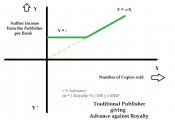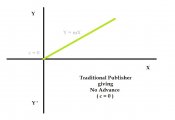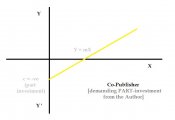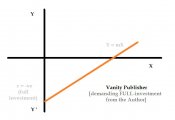Traditional Publishing
© Nirupam Banerjee, INDIA
In the Gutenberg era, writing a Book (whatever be the classification) and selling it to sufficient audience so that at least the manuscript's labour -- if not the other labours too alongside -- is eventually compensated, turned out to be mutually too different a thing. In terms of both the Money & Skill.
In those times of the Printing Press, selling N number of copies required N number of reproductions and that too beforehand. In paper & ink & binding. So the production cost was often beyond the capacity of the Authors, especially the to-be ones. Let alone the distribution cost, which too being physical then. Enabling the Books to air-travel or literally ship along the seas (e.g. in the pre 1900s) and of course also ground-travel in trucks etc to finally arrive at the 'brick & mortar' book-stores.
Gutenberg model major cost = Reproduction cost + Distribution cost.
And to tell further, even for a rich Author, there was still a problem remaining. This was the demand of a very different skill-set (compared to the writing) which was required to so reproduce and distribute and even do other things to finally close the sale. Thus, even Writing skill coupled with Money was not enough!
So a group of people (other than the Writers) smelt profit in this landscape by supplying the capital Money and those supposed extra Skills. Thus in collaboration with Writers, an industry developed. And was named traditional publishing. Its assets are:
Writing Skills + Money + Extra Skills.
If you say there is also infra-structure required, like a Publishing 'House' & several Bookstores & a Press & a Binding shop, then I'd say these are also results of Money & those supposed extra-skills. And the traditional publishing industry invited various people together supplying all those beyond-the-writing skills & the infrastructure, the Publisher (or the Publishing Company) co-ordinating them all. To collect & co-ordinate these rest of the people required a very specific skill set, which are certain publicity/connection expertise. And the Publishers were specialists in this. They also supplied the large money upfront required in the Industry to reproduce & distribute the Books in lots.
And the players in the industry became:
- Publisher
- Publishing-House Assistants [inside & outside] {employees & business people} (e.g. Editors & Literary Agents)
- Distributors
- Retailers i.e. Bookstore-personnel
Curious to note that although there were several other business people (e.g. Retailers, Distributors, Agents & even possible freelancing Editors) available to help out, the greatest STAKE in the Industry still belonged to the Publisher, the very entity who co-ordinated the entire Network. Not because the Publisher is delegating so much works (as delegation ought to rather relieve the burdens) but because the Publisher invests the largest MONEY in the industry. If questions arise as to while maintaining the Book-stores the Retailers also spent money in the rent or property-tax & electric charges etc, then answers arise that Publishers also had overhead costs like rent/property-tax & electricity bills etc to maintain their own professional houses. So these parameters cancelling out as common, what clearly sets apart the traditional publisher from the rest of the industry is the Huge-investment behind the production & distribution costs of the Book itself.
If significant money is required for the 'birth' of a Book (in front of the Public) then what is it that balances the stake? The answer is: SALE-ABILITY.
So the traditional publisher has to 'judge' Manuscripts on the Sellability. And they became so confident about the sales that they even offered an Advance money to the Authors (before the book's release). And the greater the advance, the more it reflected their confidence in the Writer.
So, on the Writer's side of the story, the Sale-ability (or sellability) became a potentially NECESSARY condition for getting selected.
Although sometimes, the Publishers did make 'mistakes' in such sales judgement (as some books didn't hit) — but statistically speaking, their sales forecast clicked in a significant % or number of cases so that the losses in some books were more than compensated by the success in others. And they remained in the business.
So the conclusion of the sale-ability being a necessary condition is statistical.
In principle however, it has to be necessary.
But there may be a catch!
That is, my counter question is that —
Is sale-ability a SUFFICIENT condition, in general?(socially controversial or unacceptable topics aside) ♦
§ Advance against Royalty
The Advance is available only with the Traditional Publisher. Who next gives Royalty depending upon the sales. The more the sales, the more this next money. In fact, it is directly proportional to the no. of sales.
Thus the Writer's transaction with the Traditional Publisher follows the graph where:
y = c initially; & y=mx after a period, when the potential Royalty was making up the Advance.
The variables are:
y = Writer's Income from the Publisher
x = No. of Book sales
& the constants are:
m = Royalty per each copy of the book [expressed usually as a % of the Book's MRP i.e Maximum Retail Price]
= slope ratio
c = Advance before the book is released
= the height of y-axis where the graph starts.
For Non-traditional publishers, the c is negative.
That is: one of the SYMPTOMS of the Non-traditional Publishers in the Gutenberg/Press model is that, they rather demand money from the Writer to publish the Book.♦
§ Royalty Graphs

Traditional Publisher with Advance

Traditional Publisher with Zero-Advance

Co-Publisher

Vanity Publisher






